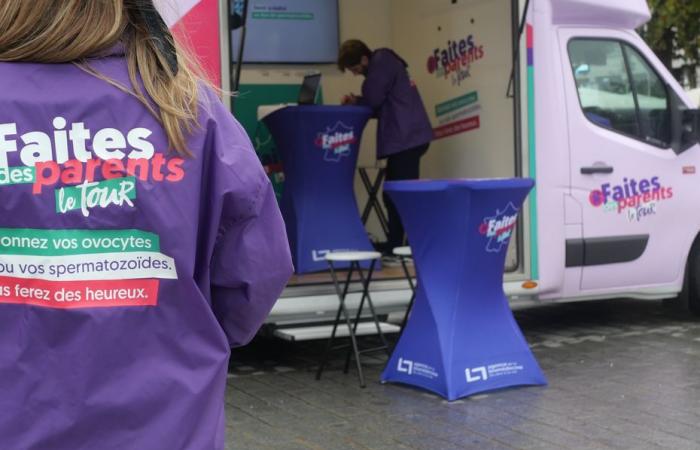
To provide information on egg and sperm donation, the Biomedicine Agency is deploying a traveling campaign, the #madeparents tour, in 10 cities in France. Wednesday September 25, it was in Nantes that the system stopped.
Company
From daily life to major issues, discover the subjects that make up local society, such as justice, education, health and family.
France Télévisions uses your email address to send you the “Society” newsletter. You can unsubscribe at any time via the link at the bottom of this newsletter. Our privacy policy
“Have you ever heard of egg and sperm donation?” It is with this question that Sylvie Labas, volunteer for the #faitesdesparents campaign, calls out to passers-by in Nantes this Wednesday, September 25, at Place du Commerce.
Since 10 a.m., a stand and a small van, bearing the inscription #faitesdesparents, have occupied the place. What is it about? An unprecedented campaign from the Biomedicine Agency to raise awareness among the French population about egg and sperm donation.
From September 18 to October 11, a bus will stop in 10 cities in France to recruit gamete donors. On site, people who have made a donation, others who have benefited from it, as well as specialist doctors from the donation centers answer questions from interested parties.
Since the 2021 law relating to bioethics, which authorizes female couples and single women to use medically assisted procreation (MAP) in France, requests for support have increased. Going from around 2,000 requests per year before 2021 for sperm donation to almost 13,000 in 2023.
More than 20 years ago, Marianne used PMA for the first time. She and her partner had to wait two years at the time for Marianne to benefit from a sperm donation. “There is really a need, a necessity to have donations because there are too many expectations”she confides.
She adds: “You shouldn’t hesitate. We really had this desire to be parents, to have a child, from the first beat of his heart, during the first ultrasound, until our last heartbeat as parents.”.
There is really a need, a necessity to have donations because there is too much waiting
MarianneRecipient of a donation
Sylvie Labas is 43 years old, for two and a half years, she has been the mother of a little boy whom she had “thanks to a sperm donation as part of a solo PMA in Spain”.
For her, who was an egg donor before becoming a mother, “plant small seeds” When talking about gamete donation, that’s what’s important.
“In general, when we have our first contact with the gift, it is because we have an aunt, a cousin, a sister who is struggling in PMA. If you are not concerned about this in your personal life, the information never arrives. So the interest in these operations is great.”
For a woman to be able to donate her eggs, she must be between 18 and 37 years old. However, it is sometimes too late when these people hear about the donation, as Sylvie Labas points out.
“What shocked me was that many women around me were ready to take this step when I talked about it, but they were too old. The first contact with donation should not arrive at the age of 35. You don’t decide to donate your eggs by snapping your fingers. If we can plant small seeds among young people aged 20 to 25, it can change everything.”
If Sylvie Labas likes to say that she is “became the giver of happiness” thanks to her donation, she still reminds us that “It’s not trivial like sperm donation.”
Mélanie Lobert is a gynecologist specializing in fertility at Nantes University Hospital. She explains the process of egg donation.
After a first appointment with a gynecologist and a geneticist to ensure that there are no contraindications to donation, “we will stimulate the donor’s ovaries, which requires hormone injections for around ten days. During this period, there are around three or four ultrasound checks and blood tests to ensure that the stimulation takes place correctly Then there is the egg retrieval stage, which is done in the operating room..”
Cinema has contributed to the creation of prejudices around gamete donation, the most common being that of the child who knocks on the donor’s door simply saying: “Daddy?”.
If the law of August 2, 2021 on bioethics now allows the child, once he or she reaches the age of majority, to access the identity of the donor, Mélanie Lobert recalls that “in the Nordic countries where access to origins has been possible for a long time, statistics have been produced. Of all donations, only 7% of children take this step to research their origin.”
Matthieu Gaborit-Lebrequer, 36, comes from donation. Two years ago, he made a request to access the origins of his donor, for a reason different from those of common fantasies. “I made the request to obtain health information. This is something that interests me all the more since I have children and a genetic heritage that is unknown to me.”
If this type of prejudice can be an obstacle to donating, the main obstacle remains that of ignorance. The operation launched by the Biomedicine Agency is therefore a way of trying to overcome this problem in order to hope to better meet demand in the years to come.
Find us on our networks and on our site france.tv





